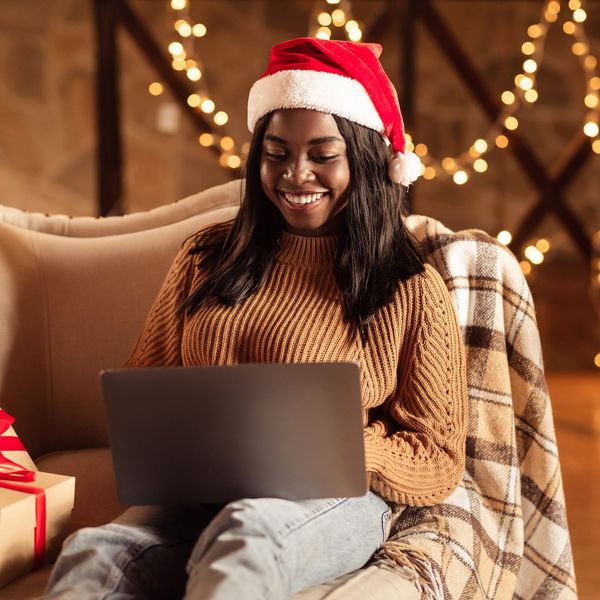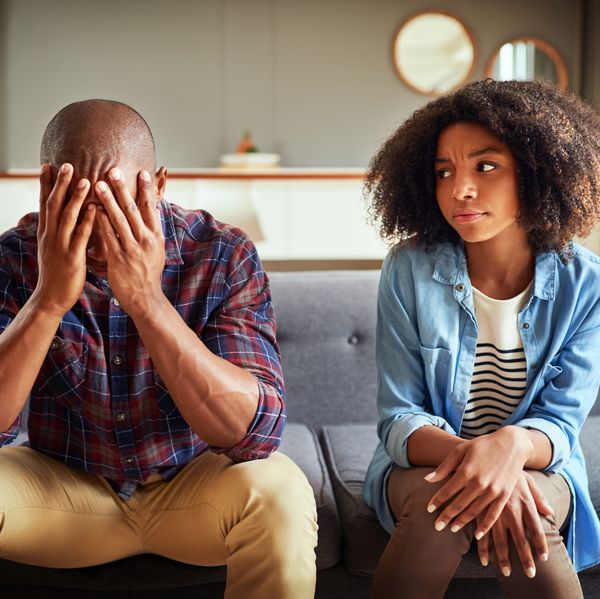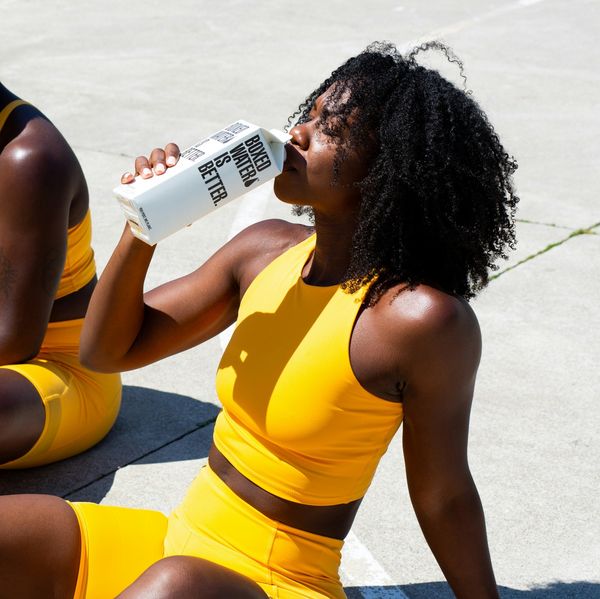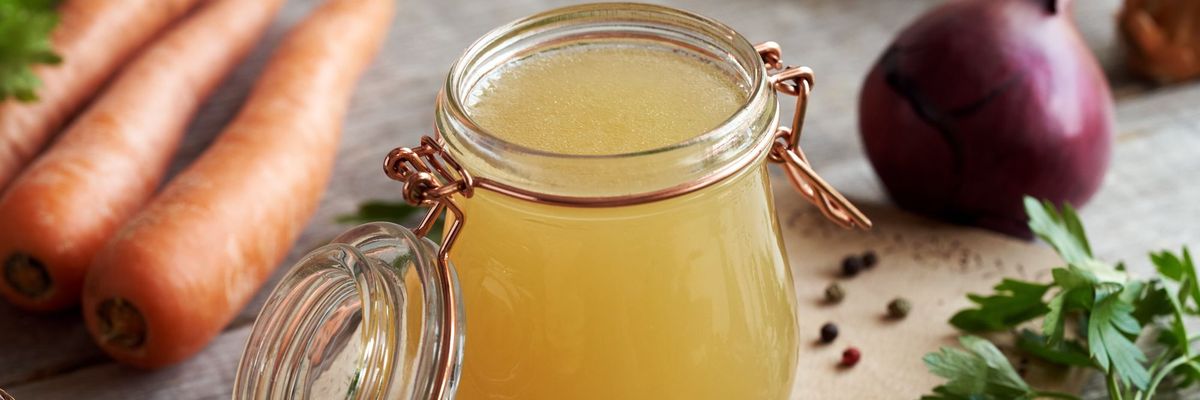Gina Prince-Bythewood On 'The Old Guard' & Creating Space For Black Women In Hollywood

Since commanding our attention with Love & Basketball 20 years ago, Gina Prince-Bythewood has been laser-focused on creating space for Black women in Hollywood. That mission doesn't change now that she has made history with Netflix's latest action film, The Old Guard.
As grand as this moment is, Gina isn't impressed by the fact that she is the first Black woman to direct a major comic-book film. She questions why it took all this time instead. "I hate that we're still having firsts in 2020," she tells xoNecole. "It's like, at what point does it stop?"

The Old Guard, which zooms in on an intimate camp of immortal mercenaries, isn't a mere win for Gina. In her eyes, it's a chance to ensure that Black women both in front of and behind the camera are no longer denied the shot to display the full scope of their talent. "I had a no-fail policy because I know how Hollywood works," she stresses. "There's such a spotlight on the few of us here that we have to succeed because in our success, others will get the opportunity."
In this xoChat, Gina reflects on cementing her name with Love & Basketball, overcoming rejection in Hollywood, and making room for KiKi Layne to shine in The Old Guard.
xoNecole: This year, you celebrated 20 years of 'Love & Basketball'. How has it been taking in how deep of a mark your first feature film has made?
Gina Prince-Bythewood: It really is amazing. It never gets old to hear that people dig the film. It's surreal that a film that was so hard to get made, that was such an incredible fight, that was such a personal story, has had longevity and that people still share it with family and friends after all this time. As an artist, that's what you dream about, of having your work sustain itself and affect people, so I'm blown away by it. It inspires me to keep doing what I'm doing.

Aimee Spinks/NETFLIX
What lesson from those early moments in your career do you keep close to the heart?
Overcome "no". That's the biggest thing. You only need one "yes".
When considering obstacles you’ve faced on your path, what keeps you from being jaded two decades into your career?
I'm acutely aware of the things that Hollywood has done wrong [and] how they're complicit in what is happening right now during this national reckoning, but what keeps me in this is I love to tell stories, I love what I do, and I know how important TV and film can be in shaping perception and changing culture. That sustains me. I only do things that I'm passionate about, and there are so many stories I want to tell, so there's always that excitement for me to get this into the world. The thing that creeps in every once in a while is knowing how hard it is to get some of these stories out there, but because I'm so passionate about it and know the game after 20 years and know that at some point somebody is going to say "yes", that absolutely keeps me going.
"I'm acutely aware of the things that Hollywood has done wrong [and] how they're complicit in what is happening right now during this national reckoning, but what keeps me in this is I love to tell stories, I love what I do, and I know how important TV and film can be in shaping perception and changing culture. That sustains me."

Aimee Spinks/NETFLIX
Thinking about the power that TV and film has, what on screen impacted you the most, especially when you think about why you decided to become a filmmaker in the first place?
There were two moments. When I was younger, I remember my family used to always sit down and watch M*A*S*H [together]. Then, one day I happened to turn the channel and Diff'rent Strokes was on, and it was the first time I felt like I saw myself reflected in this box, and I just became obsessed with it. Then in high school, when I was 17, I went to the movies and a trailer came up for She's Gotta Have It, and I got that same jolt of seeing a Black woman up there, and it affected me deeply. I wanted to give us that same jolt and give us the opportunity to see ourselves in ways that we can be inspired by.
With 'The Old Guard', you’ve become the first Black woman to direct a major comic-book film. How do you feel about that?
I hate that we're still having firsts in 2020. It's like, at what point does it stop? But, I'm proud of the fact that I got this opportunity to do it. I certainly worked hard to get it, and once I got it, I had a no-fail policy because I know how Hollywood works. There's such a spotlight on the few of us here that we have to succeed because in our success, others will get the opportunity. I carried that with me every day. That pressure fueled me as opposed to making me run away from it. I know that there are so many dope sisters out there that are as capable and eager to do the same thing, so I'm looking forward to them getting the shot.
"There's such a spotlight on the few of us here that we have to succeed because in our success, others will get the opportunity. I carried that with me every day. That pressure fueled me as opposed to making me run away from it. I know that there are so many dope sisters out there that are as capable and eager to do the same thing, so I'm looking forward to them getting the shot."

Aimee Spinks/NETFLIX
'The Old Guard' is an adaptation of the Greg Rucka comic book of the same name. What was it about this story that you gravitated to the most?
The [part I gravitated to] most was the fact that one of the old guards is a young, Black female hero. I was like, "Yeah, I need to put this in the world." I dug that she was naturally a warrior. There was such a normalcy to that. There wasn't some traumatic event that happened to her that forced her to find her strength. She was a Marine. She had it in her. It was innate in her. I love that narrative, and I love that it was two women at the forefront of the story with that same warrior mentality that I think that we all have, but we haven't always been given the encouragement to tap into. I also really dug the story. I liked what it had to say about finding your purpose and the importance of that, which was something very personal to me, and I felt the audience could connect with that despite the fantastical premise. I love that it was about the tragedy of immortality as opposed to the aspirational aspects. Prior to this movie, I used to think, I wish I could live forever. You think about the courage that would give you if you knew you couldn't die, but in doing this [film], you understand what that really means.
In our recent chat with KiKi Layne, she commended you for not allowing the action in the film to overpower the heart of the characters. Why was this so important to you?
What I love about the genre is the direction that it's really been going in the last couple of years where they feel more like action-dramas. That's what I love. I want to be able to care about the characters and not just watch action. If you don't care about the characters, if they're not furthering the story, then it gets monotonous to me. What I wanted to bring to this film was story first and character first, so that you, as an audience, are invested in and care about these people that you're spending two hours with.
You’ve dedicated your career to creating space for Black women to live on screen. What do you hope viewers take away from KiKi’s embodiment of Nile?
KiKi rocked it. I really want us to be able to look up on screen and see ourselves in a way that's inspiring. The best moment of this process was when we had an audience screening, and this sister, 22-years-old, commented that she wished she had Nile when she was 12-years-old. That was so dope to me. If we can see it for ourselves, we can start to live in that type of truth. The thing that makes Nile so badass is not just her strength and her swagger and her courage, but also her empathy and her vulnerability. I think that Nile and KiKi really embody all of that, and I think that she is definitely someone that we can aspire to be.
"If we can see it for ourselves, we can start to live in that type of truth. The thing that makes Nile so badass is not just her strength and her swagger and her courage, but also her empathy and her vulnerability. I think that Nile and KiKi really embody all of that, and I think that she is definitely someone that we can aspire to be."
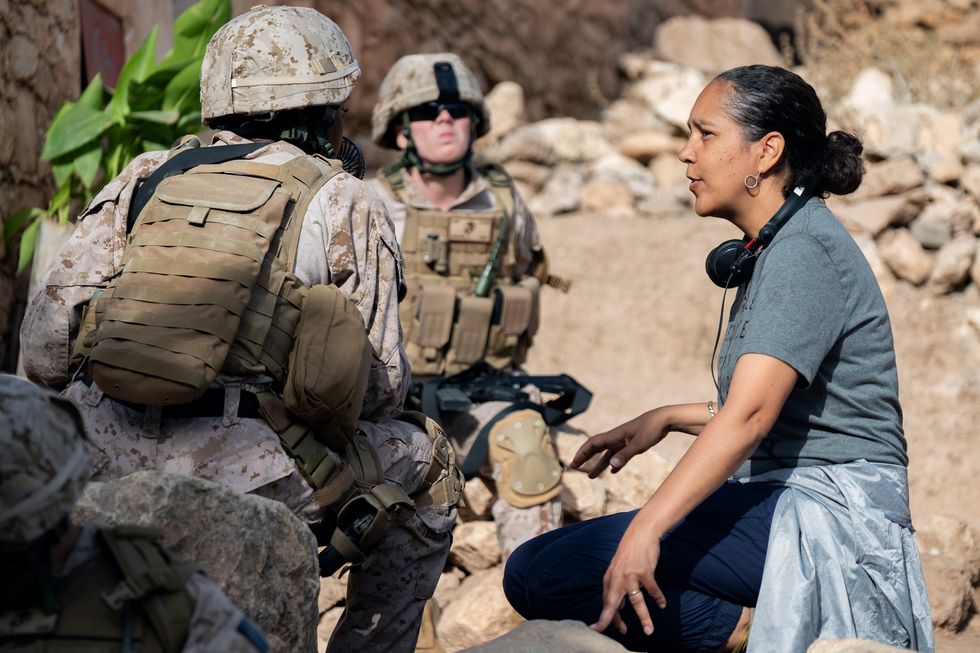
Aimee Spinks/NETFLIX
With one superhero film down, where do you go from here?
As soon as I finished [The Old Guard], I was exhausted. It's a lot to shoot a film like this. I just kept thinking that I can't wait to get to another movie in my head that I want to write that's smaller and more personal. I was going to take six months off and just relax and write and shoot that, and then this script came to me that's just so dope. It's going to be announced very shortly. It just felt like everything I've done in my career, including The Old Guard, put me in a position to be able to make this film for us, so that little movie that's still in my head is going to have to wait another two years (laughs).
For more of Gina, follow her on Instagram. The Old Guard is now streaming on Netflix.
Featured image by Getty Images
This Is How To Keep 'Holiday Season Stress' From Infecting Your Relationship
Hmph. Maybe it’s just me, but it seems like there is something really weird happening in the fall season air (because winter doesn’t officially begin until December 21) that cuddle season is in full swing while break-up season is as well. In fact, did you know that break-ups are so popular during the holiday season that December 11 is deemed Break-Up Day?
The reasons why relationships shift around this time vary; however, I did both roll my eyes and chuckle when I read that a very popular one is because it’s an easy way to get out of getting one’s significant other a Christmas present. SMDH.
Anyway, I personally think that the less shallow folks out here may contemplate calling things “quits” or they at least distance themselves a bit from their partner (and what I’m referring to is serious relationships) due to all of the stress and strain that oftentimes comes with the holidays whether it be financial, familial, due to their tight schedules or something else.
Listen, I would hate for you and your man to miss the fun and happiness of experiencing this time of year, all because you are so overwhelmed or irritated that you can’t really enjoy it. That’s why I have a few practical tips for how to avoid allowing the typical holiday season stress from INFECTING your relationship.
Manage Your Expectations
 Giphy
GiphyUnmanaged expectations. If there is a main reason why the holiday season tends to be so stress-filled for so many people, I’d bet good money that this is the cause. And when you’re in a long-term relationship, expectations can manifest themselves in all sorts of cryptic and/or unexpected ways. You might have relatives who assume that you are going to be with them for Thanksgiving or Christmas when you have other plans in mind. You might be thinking that you are going to spend one amount for presents while your man is thinking something totally different. When it comes to scheduling, your signals may be crossed.
And you know what? To all of these scenarios, this is where clear and consistent communication come in. Don’t assume anything. Don’t dictate anything either. From now until New Year’s, mutually decide to check in once a week, just to make sure that you are both on the same page as it relates to the holidays and what you both are thinking will come along with it. The less blindsided you both feel, the less stressed out you will be. Trust me on this.
Set (and Keep) a Budget
 Giphy
GiphyOkay, so I read that last year, 36 percent of Americans incurred some type of holiday-related debt. Hmph. Last year, there was still some sense of normalcy in this country, chile, so I can only imagine what finances are gonna look like over the next several weeks. That said, since I don’t know a lot of people who don’t find being broke stressful, make sure that you and your bae set a budget and then stick to it this year — no ifs, ands or buts.
Because really, y’all — it doesn’t make sense to deplete savings and/or max out credit cards for a few days of giggles only to be damn near losing your mind because you don’t know how to make ends meet come Dr. Martin Luther King, Jr. Day.
And by the way, this tip doesn’t just speak to things like food and gifts; I also mean travel. If it doesn’t make a ton of sense (or cents) to be all over the place this year — DON’T BE.
Keep Matthew 5:37 at the Forefront
 Giphy
GiphyIf off the top of your head, you don’t know what Matthew 5:37 says, no worries, here ya go: “But let your ‘Yes’ be ‘Yes,’ and your ‘No,’ ‘No.’ For whatever is more than these is from the evil one.” That verse right there? Oh, it’s a boundaries lifesaver! I say that because do you see “maybe” or “I’ll think about it” in there? Nope. LOL. It says that you should tell people “yes” or “no” and leave it at that — and that complements Anne Lamott’s quote, “’No’ is a complete sentence” impeccably well. Yeah, you’ve got to remember that anything beyond a yes or no to a request is privileged information; you don’t owe anyone details or an explanation.
Besides, if you are really honest with yourself, when someone asks you something and you give a “Umm, let me think about it” kind of reply, more times than not, you already know what your answer is going to be — so why not let you both off of the hook? Give your response. Commit to that. And let everyone (including yourself) get on with their lives and schedules.
I promise you that when it comes to those holiday parties, you are pissing more folks off by not RSVP’ing or doing so and not showing up than just saying, “Thank you but not this year” off the rip.
Remember That Your Personal Space Is Privilege Not a Right
 Giphy
GiphyA friend of mine recently bought a new house and invited me over to come see it. He’s a single man with no children, so as I was taking in all of the space that he had, especially as I walked through his finished basement, I joked about relatives coming to live with him. “Hell no” and “absolutely not” were pretty much his immediate responses as he went on to say that some folks even had the nerve to be offended when he told them that he had no intentions on taking DNA in.
Ain’t it wild how people think that your stuff is their right? And yes, that brings me to my next point. Your home is your sanctuary space. If you want to host folks this year — cool. If not, ALSO COOL. Please don’t let folks (family included) guilt you into how they want you to act or even into what they would do if the shoe was on the other foot. You are not them — and as one of my favorite quotes states, “If two people were exactly alike, one of them would be unnecessary.” (A man by the name Larry Dixon said that.)
Hell, my friends? They know that I am good for sending them random things that they need or even want all throughout the year. Coming over to hang out at my pace, though. Uh-uh. Chalk it up to being a card-carrying member of the ambivert club yet I like keeping my living space personal — and I sleep like a baby, each and every night, for feeling that way.
Always remember that your space, your time, your resources, your energy and shoot, yourself period (including your relationship), are all things that are your own. You get to choose how, when and why you want to share them. The holiday season is certainly no exception.
Cultivate Some “You Two Only” Traditions
 Giphy
GiphyIt’s not uncommon for some couples to hit me up after the holiday season to “detox.” Sometimes it’s due to the financial drama (and sometimes trauma) that they experienced. Sometimes it’s because they allowed their relatives (especially in-laws) to get more into their personal business than they should’ve. More than anything, though, it tends to be because they didn’t get enough quality time together and so ended up feeling “disconnected.”
Please don’t let that happen. Listen, I’m not even a holidays kind of woman and yet, I will absolutely sit myself down with some hot chocolate and chocolate chip cookies to enjoy a Hallmark holiday film or two. Aside from the fact that most of them are lighthearted and sweet, I also like that they usually focus on couples loving on each other amidst all of the holiday beauty and ambiance — which is something that all couples should set aside some time to do.
Maybe it’s a vacation. Maybe it’s a staycation. Or maybe it’s my personal favorite, A SEXCATION. Whether it’s for a few days, the weekend or even overnight — don’t you let the holidays go by without setting aside time for you and your man to celebrate one another. Don’t you dare (check out “Are You Ready To Have Some Very Merry 'Christmas Sex'?”).
GET. SOME. REST.
 Giphy
GiphyI once read that 8 out of 10 people get stressed out over the holidays and 3 out of 10 lose sleep during to it — and when you’re stress-filled and sleep-deprived, that can absolutely lead to hypersensitivity, making mountains out of molehills and even not being in the mood for sex.
Your relationship can’t afford to go through any of this, so definitely make sure to prioritize rest. I don’t care how unrealistic it might seem during this time, sleep should never be seen as a luxury; it will always and forever be a great necessity.
That said, try to get no less than six hours of shut-eye in (check out “6 Fascinating Ways Sex And Sleep Definitely Go Hand In Hand”) and even ask your bae to take a nap with you sometimes (check out “Wanna Have Some Next-Level Sex? Take A Nap, Sis.”). Not only will sleep help to restore your mind, body and spirit but, when it’s with your partner, it’s an act of intimacy that can make you both feel super connected, even in the midst of what might feel like chaos.
___
Holiday season stress is real. Still, never give it the permission or power to throw your relationship off. Put you and your man first and let the holidays be what they are gonna be, chile.
Let’s make things inbox official! Sign up for the xoNecole newsletter for love, wellness, career, and exclusive content delivered straight to your inbox.
Featured image by Shutterstock
There’s just something about the chilly weather that makes you want to be curled up with a warm blanket, sipping on your soup of choice. Whether that be chicken noodle, tomato, or even a hearty chili soup, the options and benefits to your overall health are endless.
Everyone knows that a great soup first starts with a rich and tasty broth. According to nutrition expert Dr. Kellyann Petrucci, having a perfect broth isn’t just about the flavor, it’s about the nutrients and health benefits that it can offer you from collagen, gelatin, and glycine. “Bone broth is the best whole food source of collagen,” Dr. Petrucci tells xoNecole. “Collagen protein is in foods such as cuts of meat full of connective tissue like pot roast, brisket, and chuck steak. Bone broth has emerged as a superior whole food source of collagen because it’s lower in calories and saturated fats compared to other sources.”
When it comes to soups, stews, and stocks, choosing the right broth can come down to personal preference, time for preparation, and dietary restrictions, however, bone broth proves to be nutritionally superior to regular broth or stock due to its extended cooking process.
“Bone broth derives all of its nutritional health benefits from its slow cooking process,” she explains. “While regular broth or stock is only cooked for a few hours, bone broth is usually cooked for upwards of 24 hours.”
“It's in that process that the vital nutrients are extracted from the bones, giving bone broth its signature thick texture, rich flavor, and nutritious content. While stock has some health benefits, it doesn’t hold a candle to bone broth’s nutritional density,” Dr. Petrucci adds. But if you find that you don’t have the time to make your own bone broth, you can always opt for a ready-made liquid bone broth for convenience.
Because soup can require extended time of preparation and slow-cooking, many soup lovers are leaning into a more convenient, “one-and-done” approach to achieve their favorite recipes — one of which is being made in a mason jar.
@plantyou Mason Jar Soup #soup #vegan #healthy #healthyrecipe #plantbased #plantbaseddiet #mealprep #foodprep #veganmealprep #schoollunch #worklunch #healthylunch
The mason jar soup trend has grown in popularity on TikTok, with promises to be a labor-free, meal-prep alternative for soup lovers who also happen to be on the go.
Making these soups on your own is easy to follow since many of the ingredients are catered to your own taste. Many creators suggest following the ingredient list that includes rice noodles, soy sauce, chicken bouillon seasoning or broth, a protein of choice — tofu, mushrooms, or boiled egg, and veggies like spinach, cabbage, or carrots.
With just five minutes of prep time, you can assemble these ingredients into your mason jar, add boiling water on top, and wait up to 10 minutes for the flavors to combine and enjoy.
@nutritionbykylie Another mason jar noodle recipe for all my miso soup lovers! (Miso can clump up so it may help to shake it a little) #mealprep #easylunch #masonjarnoodles #misosoup
Finding creative ways to add soup and broth into your diet isn’t just a way to self-soothe on low-temperature days, it can also help with gut-related issues and support healthy digestion. “Our digestive health is the cornerstone of our overall wellness, and bone broth is packed with beneficial nutrients that nurture this crucial system,” says Dr. Pertrucci. “Amino acids, like glutamine present in bone broth, can provide nourishment to the cells lining your gut, supporting the body's nutrient absorption capability.”
“The immune system, the body's primary defense mechanism, depends significantly on the health of our gut. As bone broth can contribute to gut health, it can also indirectly aid in fostering a robust immune system. Bone broth can act as a valuable ally in maintaining a healthy immune system, fortifying your body's defense against illnesses.”
Who knew a good soup could go such a long way?
Let’s make things inbox official! Sign up for the xoNecole newsletter for love, wellness, career, and exclusive content delivered straight to your inbox.
Featured image by Shutterstock
Originally published on November 3, 2023



